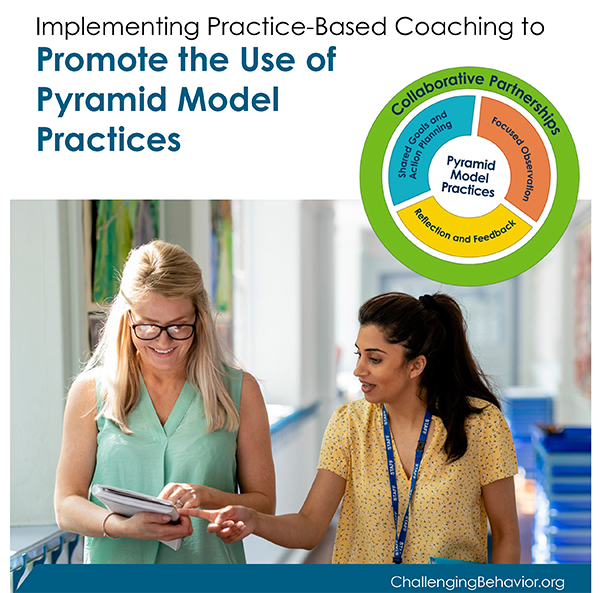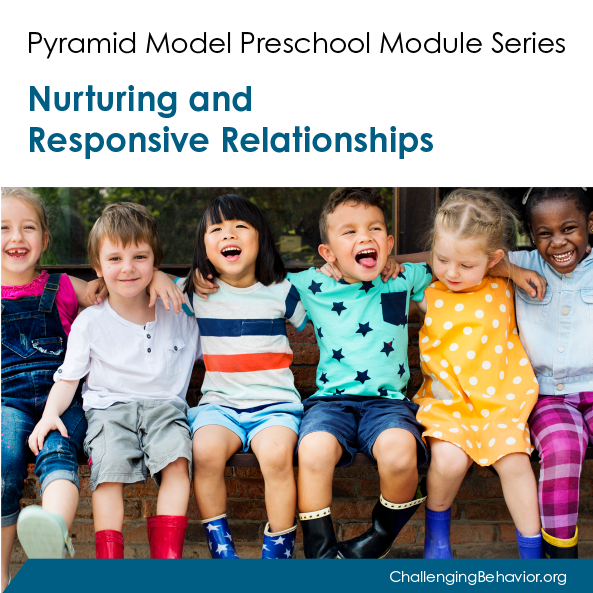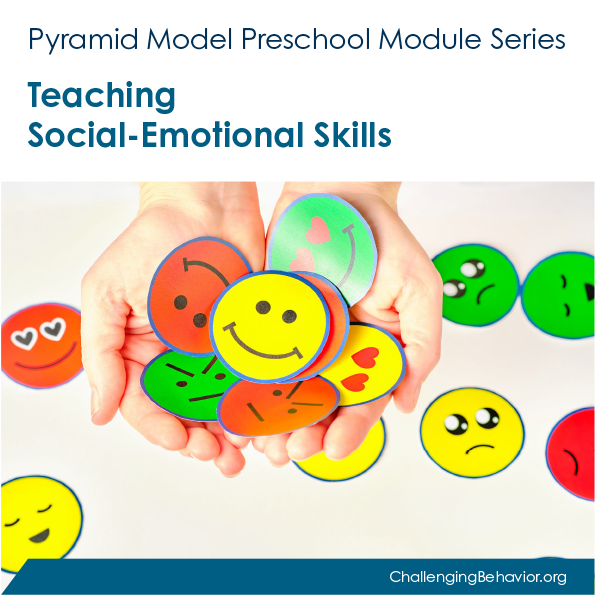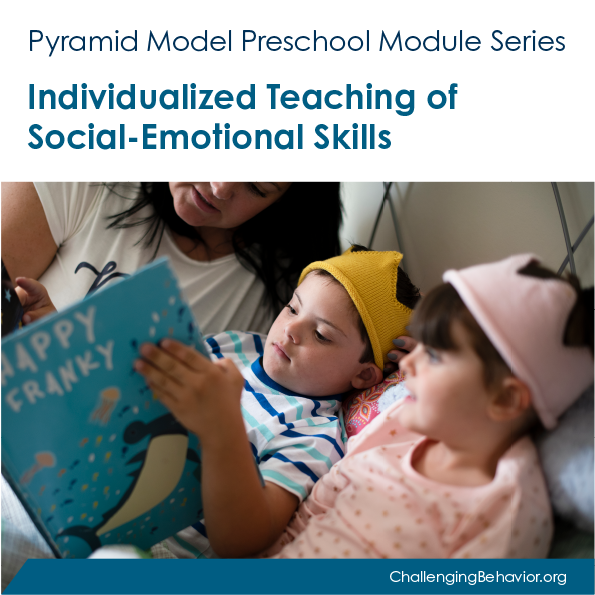These modules provide the types and content of training that would be most useful in addressing the social-emotional needs of young children. These modules have been used nationally to provide training on Pyramid Model practices within various settings. Each module package includes a presentation script, slides, videos, activity descriptions, and handouts.
Note: Some offices block the ability of users to download .ZIP files on work computers. If you are having trouble downloading the files, check with your IT department to make sure you have permission or use a personal device.
NCPMI Training Modules
Promoting Social and Emotional Competence of Infants and Toddlers
These modules provide training content on the Pyramid Model practices for promoting the social and emotional competence of infants and toddlers in an early childhood classroom.
Looking for translated modules? Check our community contributions page using filter category “Infant/Toddler Training Modules.”

In Focusing on Relationships, a module of the Pyramid Model Infant-Toddler Module Series, participants will explore the importance and complexities of developing relationships between caregivers, families, and children. Participants should leave understanding that social-emotional development takes place within the context of relationships, so strategies to support development must prioritize building relationships. This training covers topics such as reflecting on participants’ past and current relationships, as well as addressing issues related to culture, diversity, race, equity, risk, and protective factors.

In Responsive Routines, Schedules, & Environments, a module of the Pyramid Model Infant-Toddler Module series, participants will learn how being intentional about establishing daily routines and setting up the environment can: help young children feel confident and secure, paving the way for social-emotional growth; promote children’s active and safe exploration and learning; and facilitate positive child-peer and adult-child interactions.

Working with infants and toddlers is rewarding, but it can also sometimes be challenging. In Understanding Behavior, a module of the Pyramid Model Infant-Toddler Module Series, participants will learn how to use observation to better understand child behavior. We will look at the many influences affecting behavior and use this knowledge to examine our own beliefs. We will practice reframing our thoughts to better respond to challenging situations.

In Teaching About Feelings, a module of the Pyramid Model Infant-Toddler Module Series, participants will explore what the development of emotional literacy looks like (i.e., labeling feelings in self and others, recognizing facial and physiological signs, modulating responses, developing coping strategies) and share a variety of strategies teachers can use to support and teach the young early learners in our care about feelings.

In Positive Peer Interactions, a module of the Pyramid Model Infant-Toddler Module Series, participants will gain knowledge on how to facilitate positive peer interactions and support the development of social and friendship skills, learn about the developmental stages of social and play skills, and apply that knowledge to classroom practices.

In Individualized Teaching, a module of the Pyramid Model Infant-Toddler Module Series, participants will learn how to identify and address delays in social-emotional development. The module provides an overview of the screening and assessment process and guidance on how to develop a systematic plan to provide individualized teaching to children who have delays.

In Challenging Behavior, a module of the Pyramid Model Infant-Toddler Module Series, participants will: identify and define challenging behavior, and work to understand why challenging behavior happens; discuss how to gather data and implement strategies that will prevent challenging behavior; and discuss strategies to address or respond effectively to challenging behavior when it is present.

This module introduces the Pyramid Model framework to participants and should be used before the other modules. Topics include: the relationship of the Pyramid Model to prevention science, equity, inclusion, trauma-informed care, anti-bias practice and the use of data for decision-making, understanding child behavior, and the research that provides an evidence-base for the use of the Pyramid Model.
Implementing Practice-Based Coaching to Promote Use of Pyramid Model Practices

This module provides training content in Practice-Based Coaching (PBC) for coaches new to the PBC framework or those using PBC to support practitioners in their use of Pyramid Model practices. The full-day training includes slides, activities, and trainer notes.
Promoting Social and Emotional Competence in the Preschool Classroom
These modules provide the training content for implementing the preschool Pyramid Model practices within classrooms for young children ages 2-5 years.
Looking for translated modules? Check our community contributions page using filter category “Preschool Training Modules.”

This module introduces the Pyramid Model framework to participants and should be used before the other modules. Topics include: the relationship of the Pyramid Model to prevention science, equity, inclusion, trauma-informed care, anti-bias practice and the use of data for decision-making, understanding child behavior, and the research that provides an evidence-base for the use of the Pyramid Model.

Establishing nurturing and responsive relationships within a caring community is the foundation of the Pyramid Model. This training focuses on practices for building relationships with children, promoting relationships between children, relationships with families that affirm family culture and identity, and relationships with team members.

This module focuses on the practices for establishing high-quality supportive classroom environments that promote social-emotional skill development and prevent challenging behavior. Practices related to schedules, routines, transitions, promoting engagement, expectations, and rules are addressed in the workshop.

This module provides the practices for understanding child challenging behavior, how to respond to challenging behavior, becoming aware of bias in responding, de-escalating behavior, and the components of developing a behavior support plan for children with persistent challenging behavior.

In this module, practitioners learn about the steps of Prevent-Teach-Reinforce for Young Children (PTR-YC) and how PTR-YC is used as a manualized process for conducting a functional behavioral assessment and developing a behavior support plan.
Parent Training Modules: Positive Solutions for Families
NCPMI has updated and expanded the Positive Solutions for Families Parent Group Materials that were originally developed by the Center on the Social and Emotional Foundations for Early Learning (CSEFEL). Positive Solutions for Families provides an evidence-based, user-friendly workshop series of seven sessions to help professionals working with parents and family caregivers to promote positive and effective parenting behaviors, which will, in turn, promote children’s social and emotional development and address the challenging behavior of children ages 2-5 years.
Sessions topics include:
(1) Making the Connection (2) Keeping it Positive (3) Behavior has Meaning (4) The Power of Routines (5) Teach Me What to Do (6) Responding with Purpose (7) Putting it All Together with a Plan, a Family Handbook, Family Materials, Facilitator’s Guide, and Presentation Materials.
Looking for translated modules? Check our community contributions page using filter category “Positive Solutions for Families Training Modules.”

Positive Solutions for Families is an evidence-based, family-friendly workshop of seven sessions to help professionals working with families of children ages 2-5 years. Zip folder provides all materials needed by a facilitator to provide the workshop series to participants.

Positive Solutions for Families is an evidence-based, family-friendly workshop of seven sessions to help professionals working with families of children ages 2-5 years. Zip folder provides all materials needed by a facilitator to provide the workshop series to participants.
Leadership Team Academy for the Program-Wide Implementation of the Pyramid Model

Trainer Resources
Participant Materials
- BoQ Excel for Entry (Excel)
- Early Childhood BoQ v3.0 (PDF)
- Implementation Plan (Word Doc)
- Leadership Team Manual (PDF)
Other Modules
Parents Interacting with Infants and Toddlers (PIWI)
PIWI has been successfully used in community-based, early head start and early intervention programs with a diverse range of parents and children. While the primary focus of the module will be on parent child groups, the training materials also provides guidance on the use of the model in home visiting. These training materials provide the professional with guidance on how to support a parent or other caregiver as they interact with the infant or toddler. The following link will take you to the Pyramid Model Consortium website.
When will PIWI modules be updated? We are unaware of updates planned for PIWI. If you are seeking information on the delivery of the Pyramid Model within early intervention, contact Lise Fox at lisefox@usf.edu.





